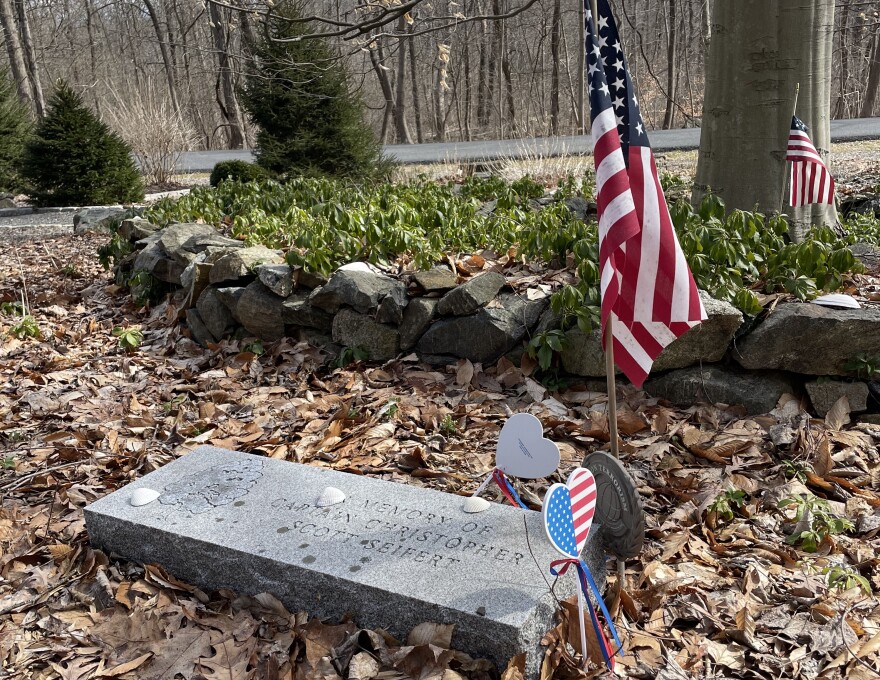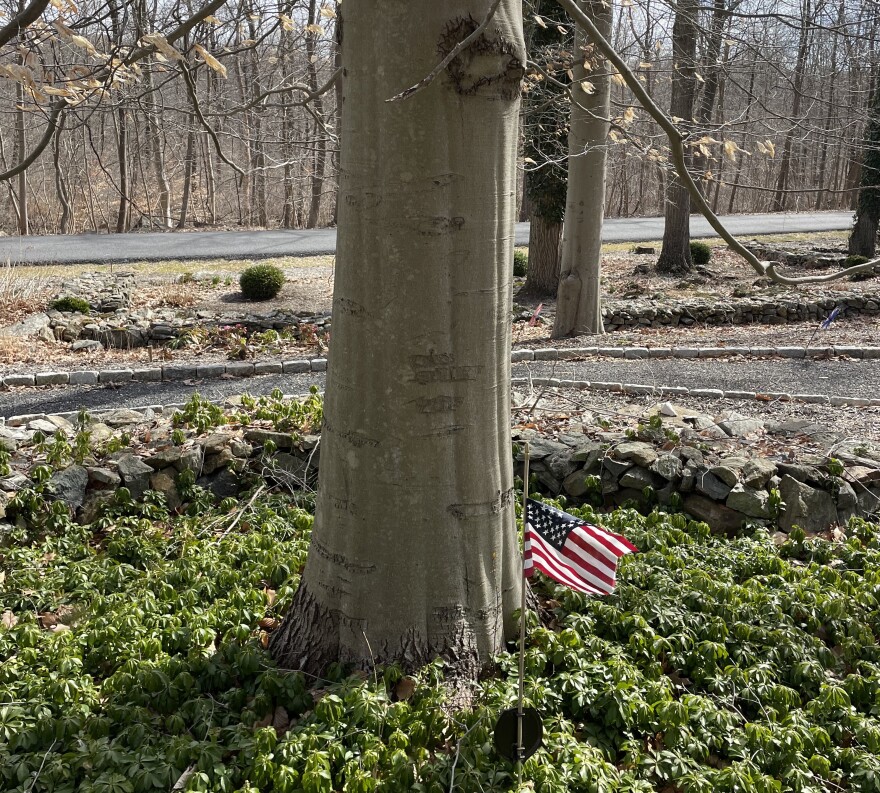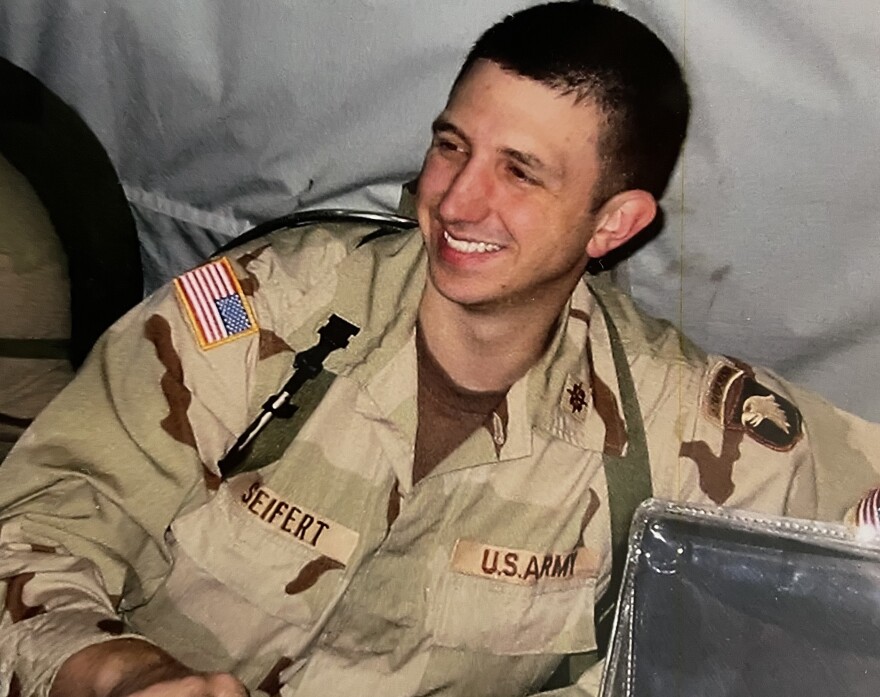WILLIAMS TWP., Pa. — The hearse backed slowly along the gravel lane toward Christopher Seifert’s boyhood home.
Inside was a flag-covered casket that held the 27-year-old Army captain’s remains.
Days earlier, Seifert became one of the first casualties of the Iraq War, killed in an ambush in Kuwait as U.S. soldiers prepared to invade for battle against the Saddam Hussein regime.
- Capt. Christopher Scott Seifert died March 23, 2003
- He was a graduate of Wilson Area High School and Moravian College
- Says a commander of his unit: 'He wore the emotion of loving the Army on his sleeve'
In the coming days he would be eulogized for his devotion to service — for his kind heart and selflessness. On this day, Seifert’s body lay under the bare, towering branches of the ash and poplar trees that stretched like cobwebs in woods he roamed as a child.
His father, Tom Seifert, had asked the funeral director for a favor. It didn’t have to be long.
“Christopher has to come home,” he said.
“I can’t have him be killed in a foreign country and not come home. He has to come home. We just took a few minutes. That’s all we asked for. It fulfilled something that needed to be done.”
The Iraq War
Twenty years ago this week, America braced for war as the United States launched a “shock and awe” bombing assault in Iraq during the war on terror.
U.S. ground forces had yet to cross the borders when word came of a deadly attack.
On March 23, 2003, two military officers died and 14 service members were injured at Camp Pennsylvania in Kuwait — a command center for the 101st Airborne Division.
In Williams Township, the Seifert family learned the news after clicking on the television. They knew that’s where Christopher was, and for the next several hours, their frantic attempts for assurances of his safety went unanswered.
They were all together: Tom and his wife Helen, who had supported their son’s pursuit of a military career; Christopher’s wife Terri — the couple had met as undergrads at Moravian College — and their son, Benjamin, who was just 4 months old.
They stayed up through the night, tethered to the television, hoping for any glimmer of information or a phone call to ease their nerves. Early the next morning, as Tom walked the dog, a car approached on the road outside.
Tom’s heart sank.
“He came up the road and I saw the uniform,” he said. “As soon as I saw it, you know what that is about. I told him ‘You tell me and you tell me right now.’ It’s something you don’t forget. You see it on TV with the military coming to the door, but you don’t expect that to happen to you.
“And I don’t really know when it hit home. There was so much going on, we really didn’t know. It didn’t sink in right away. As you get older, it’s really hard to battle what’s going on. We really miss this guy. People say to you ‘He was your only child.’ But it doesn’t matter if you had six kids.”
The enemy within
Tom and Helen Seifert are now in their 80s. The passage of 20 years has blunted some of the emotions of the early years after Christopher’s killing. But it will never fill the hole created by the loss of their only child — and the circumstances that resulted in his death.
Seifert, intelligence officer for the 101st’s 1st Brigade Combat Team, and Air Force Maj. Gregory “Linus” Stone, 40, of Boise, Idaho, died at the hands of a fellow American.
Army Sgt. Hasan Akbar became the first soldier since the Vietnam War prosecuted on charges of murdering other soldiers during wartime. He threw grenades into tents where servicemen slept and opened fire around 1 a.m. as they scrambled out into the darkness.
Akbar shot Seifert in the back at point-blank range with his Army-issue M4 assault rifle, after Seifert had emerged from one of the tents. It happened just a few days before the 101st Airborne Division stormed into southern Iraq.
A Muslim, Akbar maintained that American soldiers were going to kill Muslim women and children in Iraq. According to testimony at his 2005 court-martial, Akbar’s diary expressed anti-government views, detailed his conversion to radical Islam and foretold his plans to kill fellow soldiers.
A military jury sentenced him to death on April 28, 2005. Now 51, he awaits execution at the U.S. Disciplinary Barracks at Fort Leavenworth, Kansas.
For Helen Seifert, betrayal will always be the hardest part.
“Somebody who’s supposed to have your back and be looking out for you,” she said. “The trial was hard. That’s the ironic thing about the way Christopher was killed. If Akbar had gone to Chris, he would have gotten help. If he wanted help he would have gotten it.”
A special child
For all of the blessings Christopher brought to his parents in 27 years, they did not come easily. Tom Seifert worked at Riegel Paper in Hunterdon County, N.J., and Helen was a Lehigh Valley Hospital nurse.
“We waited 12 years for him,” Helen said. “We were married 12 years before Christopher came. I had even gotten to the point that I put our name in for adoption.
"And then, all of a sudden, we had this baby.
“He was a much-wanted child and a very loved young man. It just hurt so much when he was killed. We thought ‘This can’t be happening.’"

Christopher Seifert distinguished himself wherever he went — with the band and stage crew at Wilson Area High School, in ROTC at Moravian College and as he climbed the ranks of the U.S. Army.
Like it or not, the military was in his blood.
Tom Seifert served with the Army from 1959 to 1962, and his father was a veteran of World War I. The Seiferts last spoke to Christopher just before he deployed to Kuwait, roughly three weeks before he was killed.
“My last words to him on the phone were, ‘Don’t be a hero.’ Because I knew the way he was,” Tom said. “He was always looking after other people. He gets that from his mother.”
A push for Purple Hearts
Bart Womack remembers Seifert well. Womack, a retired command sergeant major, led the 101st’s 1st Brigade Combat Team and survived the Camp Pennsylvania attack.
“A tall guy — bright, intelligent, smart,” Womack said of Seifert. “He was like a sponge in terms of information. He wore the emotion of loving the Army on his sleeve. He always had a smile on his face.
“He was just an affable guy that everyone wanted to be around. There was nothing negative about him at all.”
Womack authored a book about the Akbar attack, “Embedded Enemy: The Insider Threat.” In recent months he has led a crusade for the slain and wounded he commanded in Kuwait, petitioning that they be awarded Purple Hearts.
“My point was that an attacker who launches a terrorist attack does not have to be associated with any organization. They can be radicalized and act on their own."Bart Womack, retired U.S. Army command sergeant major
On Jan. 9 of this year, the awards were denied by Secretary of the Army Christine Wormuth and Secretary of the Air Force Frank Kendall III. The military has long denied Purple Hearts for service members willfully killed by other service members in combat zones. Army regulations outline specific criteria that must be met.
Womack maintains that Seifert and Stone died in a terrorist attack. While Akbar’s acts of misconduct were not connected to enemy action or directly inspired by a foreign terrorist organization — circumstances under which a Purple Heart award would be appropriate — Akbar was clearly influenced by jihadi ideology, according to Womack.
“My point was that an attacker who launches a terrorist attack does not have to be associated with any organization,” he said. “They can be radicalized and act on their own. I can read about anything without having to be connected to someone in Jordan or Yemen or anything like that. [Akbar] was inspired and motivated by jihadi ideology without any trace of communicating with them.”
Last October, Womack enlisted the help of U.S. Rep. Don Bacon, a Nebraska Republican and Air Force brigadier general, to file a congressional inquiry on revising the military award regulations. But he said support is needed from other lawmakers.
“It’s not over, by a longshot,” Womack said. “This is my ministry, to get them awarded the Purple Heart. You have to be persistent. Persistence works.”
‘The Lord puts people in your path’
The Seiferts said they are buoyed by longtime relationships and military men and women they have met since that fateful day.
“Through our friends, they have helped us and supported us,” Helen said. “And the Lord puts people in your path. I am a firm believer in this. You are on this journey but he’s looking out for you, and people have come in that we didn’t even know about.”
The people and the gestures are countless, they say: Christopher’s direct supervisor, who pinned down Akbar within an hour of the carnage; the EMT who treated him; the close family friend who left his own Bronze Star from Vietnam on Christopher’s casket at Central Moravian Church; the retired serviceman who came from Texas to present the Seiferts with the silver dollar that Christopher gave him for being the first to salute the newly minted officer Seifert — a military custom.
Then there is Ben, the son who never got to know his dad.
Benjamin Seifert is in college now, a graduate of Allentown Central Catholic High School. He and his mother live not far from the Seiferts, who see Christopher in him more and more. This they cannot explain.
“He’s a good kid. He looks like his dad,” Helen said. “He has many of Chris’ mannerisms and you wonder ‘How does this happen?’ He was 4 months old. You figure a father passes these things down. But Ben didn’t have that opportunity.”
Home sweet home
The Seifert homestead in Williams Township, between Easton and Hellertown, has been in the family for generations. The heavily wooded property covers dozens of acres.
Tom and Helen said Christopher loved the refuge of the place, and there are subtle signs of him everywhere.

Tom retired from the paper mill in 2006. His mission became a memorial garden, built as a tribute to Christopher in the place he loved most. There are stone walls, pathways and flower beds that are dormant now but soon will spring to life with the season. It’s a project that's been years in the making.
Down the lane near the road, 10-year-old Christopher carved his name into an old beech tree. You can still see it, and the Seiferts took steps to preserve it.
“I guess I was like Forrest Gump. He didn’t know when to stop running and I didn’t know when to stop building stone walls.”Tom Seifert, Christopher's father
“Tom built a stone wall around it because we knew eventually we might someday have to sell and we didn’t want anybody touching that tree,” Helen says. “Because you never know.”
Jokes Tom: “I guess I was like Forrest Gump. He didn’t know when to stop running and I didn’t know when to stop building stone walls.”
Twenty years past, there’s a solemnity to the Seifert kitchen as Tom tells the incredible story of his attempt at closure — of the day his boy was posthumously brought home.
After the hearse pulled in and the ignition was cut, there was silence. No words.
Christopher died 6,500 miles away. Now his body was within yards of the house.
In a short time, a flock of wild turkeys appeared, about 15 of them, ambling under a stand of pine trees not far from the home. Their gobbles rang through the forest.
“They were talking,” Tom said.
As he related the scene, his gaze was finally broken. He looked up with the slightest hint of a grin as he recalled the straightforward words of a neighbor, a Navy man:
“The captain has come home.”


